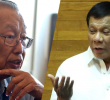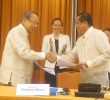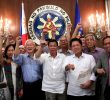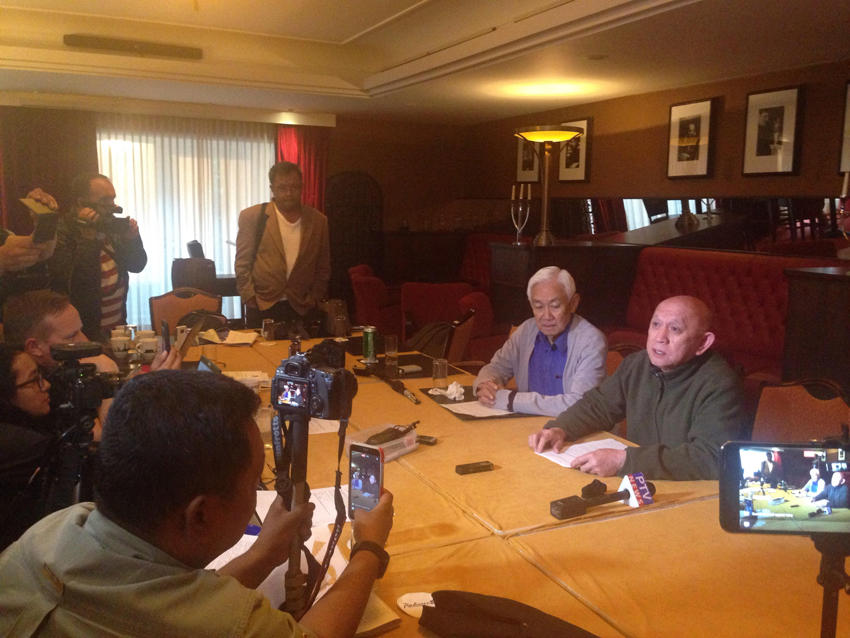
National Democratic Front of the Philippines panel chairperson Fidel Agcaoili says they will hold unilateral discussions in the Netherlands after the government refused to participate in the fifth round of talks scheduled from May 27 to June 1 in Noordwijk Aan Zee, The Netherlands. (Zea Io Ming C. Capistrano/davaotoday.com)
NOORDWIJK AAN ZEE, The Netherlands — The National Democratic Front of the Philippines said they are disappointed with the setback suffered by the formal talks with the government as they hoped to achieve an agreement on social and economic reforms.
The government peace panel on Sunday night stood by their previous decision not to participate in the fifth round of talks as they saw “no compelling reason” for the talks to continue.
Presidential Peace Adviser Jesus Dureza added there was no progress on the situation they demanded the rescinding of the order from the Communist Party of the Philippines for the New People’s Army to intensify attacks following the declaration of Martial Law in Mindanao. The NDFP said they have already made the recommendation but the CPP leadership has yet to give them a reply as the decision would need to undergo a “collective discussion.”
NDFP peace panel chairperson Fidel Agcaoili said since the government would not participate in the talks, discussions on social and economic reforms will not be able to push through.
“This setback will definitely be a big one in terms of hastening the forging of an agreement on social and economic reforms,” he said.
Senior adviser Luis Jalandoni added even on Sunday morning, the NDFP Reciprocal Working Committee on Social and Economic Reforms met and prepared for discussions with the government RWC-SER. Both Parties agree that the agenda on social and economic reforms is the “heart and soul” of the peace negotiations.
“Also our Joint Monitoring Committee for the CARHRIHL, they are here, they are prepared to have a meeting,” Jalandoni said.
Agcaoili said the NDFP plans to have unilateral consultations, however, he added that they are willing to engage in informal talks with their counterparts from the government to discuss the reforms if they will still stay in Netherlands.
“Many of our people are here, so we can finish the work on CASER. We are eager to resume peace talks now,” he said.
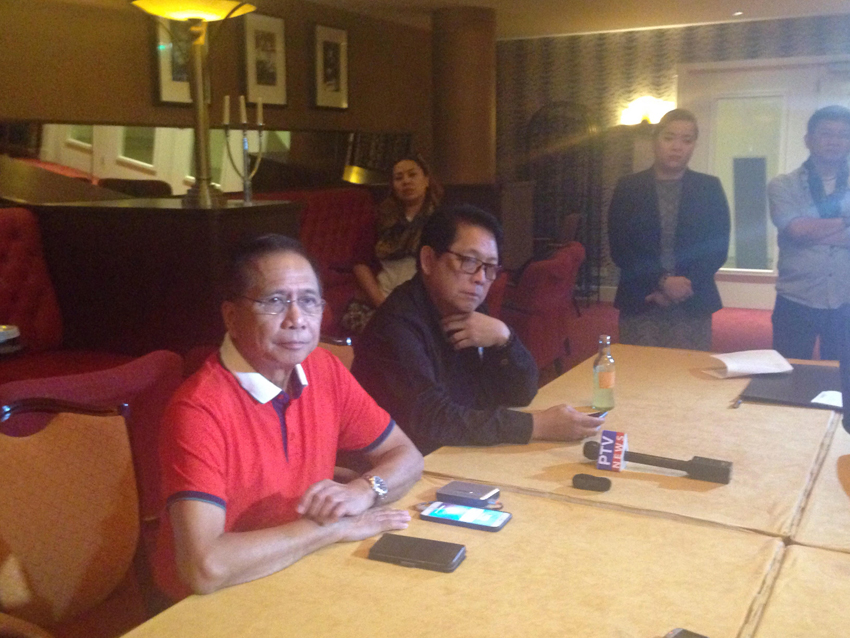
Presidential Peace Adviser Jesus Dureza and GRP peace panel Chairperson Silvestre Bello III announce Sunday, May 28 that the government is standing by its previous decision not to participate in the fifth round of the GRP-NDFP talks as there was no progress on their demand for the leadership of the Communist Party of the Philippines to rescind its order to the New People’s Army to step up its offensives. (Zea Io Ming C. Capistrano/davaotoday.com)
‘Vague demand’
Agcaoili said the government’s demand for the communists to provide an enabling environment for the talks is “vague.”
Dureza previously said the government will not participate in this round of talks “unless there were clear indications that an enabling environment conducive to achieving just and sustainable peace in the land through peace negotiations across this table shall prevail.”
Agcaoili said: “We are not sure what they mean by the ‘enabling atmosphere’… we do not have anything concrete to hold on to as to what it means.”
He said they have already recommended for the CPP leadership to reconsider the order, however, the decision will take time given the nature of the underground movement and as a “collective body”, the CPP will still have to discuss in coming up with a decision.
Secondly, Agcaoili said the government’s demand for ceasefire even without reforms in place is “premature.”
“Our position has always been unless there is agreement on social economic reforms in place, it will be premature to talk about ceasefire,” he said.
Agcaoili also cited reports from the NPAs of government’s continued operations which they say violates the people’s rights. He said two peasants were killed on after aerial bombings by government troops in the provinces in Bukidnon and Compostela Valley.
He said the aerial bombings in communities is a way of “softening resistance.”
He said the NPA is left with little choice but to undertake more tactical offensives to defend itself and the people. In its reply to the opening statement of Dureza on Saturday, the NDFP also stressed that the NPA operations should not be blamed on the leadership of the CPP-NPA-NDF.
Agcaoili said these are “defensive and counter-offensive responses to the AFP provocative actions and offensive operations.”

Norwegian Special Envoy to the Philippine Peace Process Elisabeth Slattum says despite the cancellation of the fifth round of talks, they are hopeful that the Philippine government peace panels and the National Democratic Front of the Philippines will come back at the negotiating table. Slattum made the statement shortly after the press conferences of the negotiators from the government and the NDFP on Sunday night, May 28. (Zea Io Ming C. Capistrano/davaotoday.com)
Norway remains hopeful
Meanwhile, Elisabeth Slattum Norwegian Special Envoy to the Philippine peace process said they remain hopeful that the parties will return to the negotiating table “very soon.”
“It is very unfortunate that this round of formal talks could not take place as scheduled. But it is important to remember that all peace processes go through difficult times,” Slattum told reporters here.
She cited Norway’s experience in working with peace processes around the world. She said: “what defines a successful peace process is not the absence of crises but the ability of the parties to overcome them and push through.”
The Special Envoy also recognized the dedication of both sides to the peace negotiations.
“Although this fifth round of formal talks will not take place, the peace talks have not been cancelled and the peace process remains intact,” she said. (davaotoday.com)

